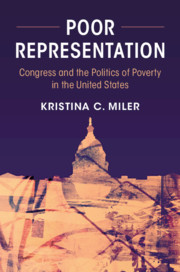Book contents
- Poor Representation
- Poor Representation
- Copyright page
- Dedication
- Contents
- Figures
- Tables
- Acknowledgments
- 1 What about the Poor?
- 2 The Political Visibility of the Poor
- 3 Congressional Inaction for the Poor
- 4 Congressional Unresponsiveness to the Poor
- 5 Legislators’ Unresponsiveness to the Poor
- 6 Surrogate Champions for the Poor
- 7 Positioned for Legislative Success
- 8 Achieving Better Representation
- Bibliography
- Index
3 - Congressional Inaction for the Poor
Published online by Cambridge University Press: 08 September 2018
- Poor Representation
- Poor Representation
- Copyright page
- Dedication
- Contents
- Figures
- Tables
- Acknowledgments
- 1 What about the Poor?
- 2 The Political Visibility of the Poor
- 3 Congressional Inaction for the Poor
- 4 Congressional Unresponsiveness to the Poor
- 5 Legislators’ Unresponsiveness to the Poor
- 6 Surrogate Champions for the Poor
- 7 Positioned for Legislative Success
- 8 Achieving Better Representation
- Bibliography
- Index
Summary
Information
- Type
- Chapter
- Information
- Poor RepresentationCongress and the Politics of Poverty in the United States, pp. 42 - 63Publisher: Cambridge University PressPrint publication year: 2018
